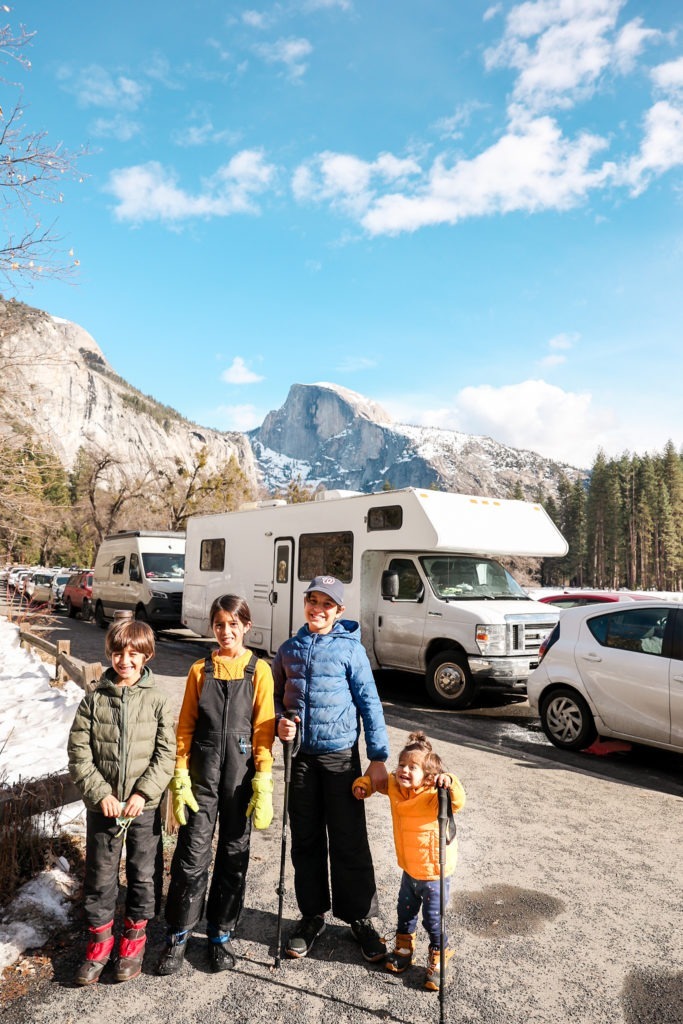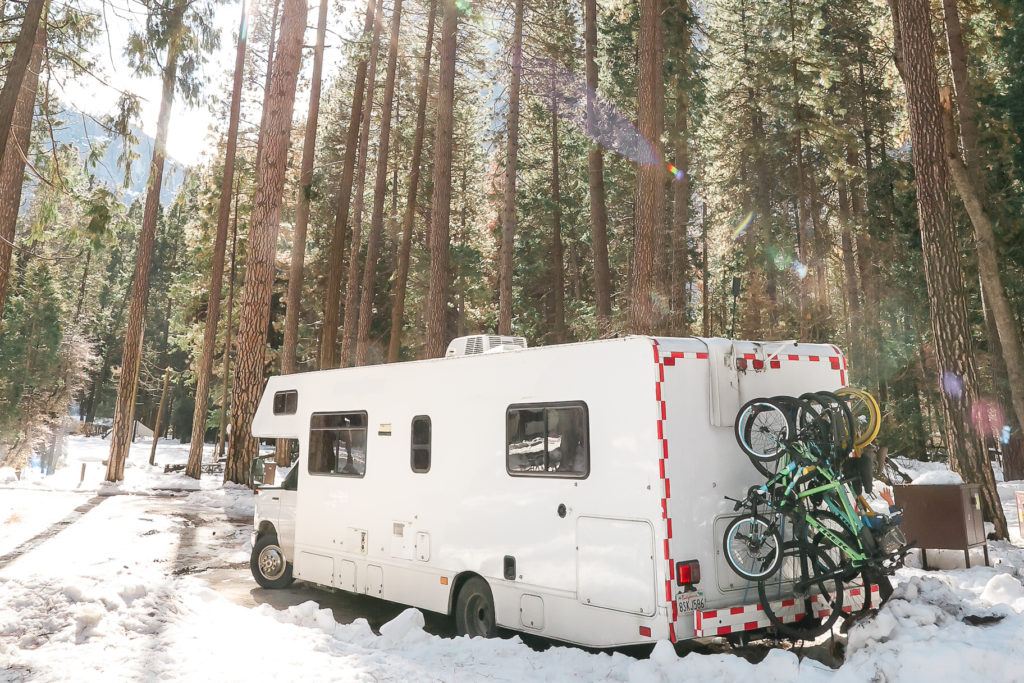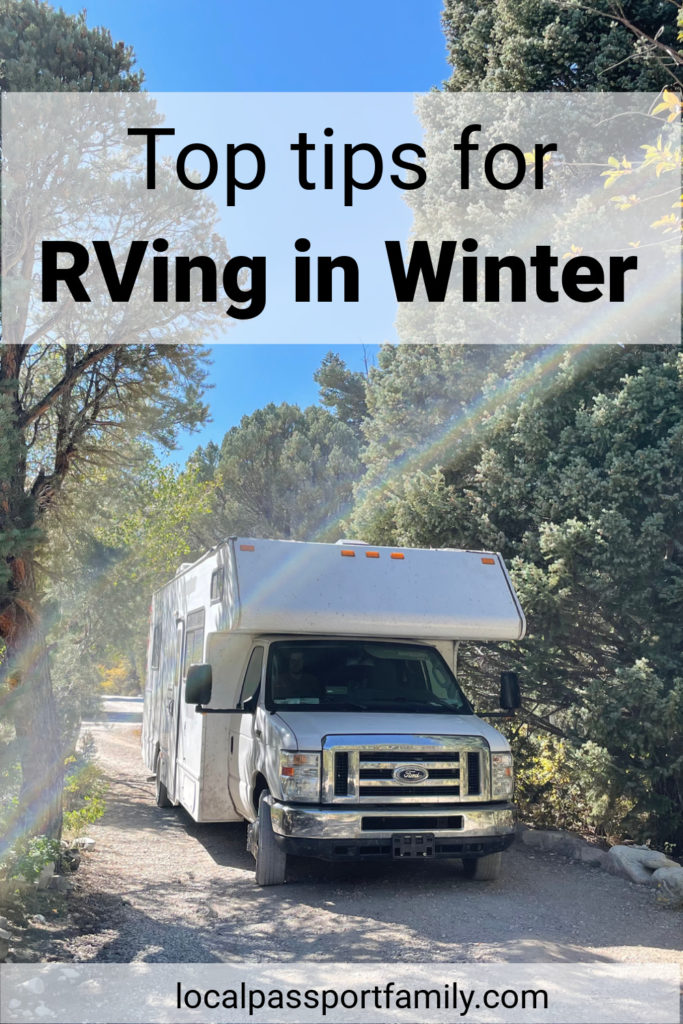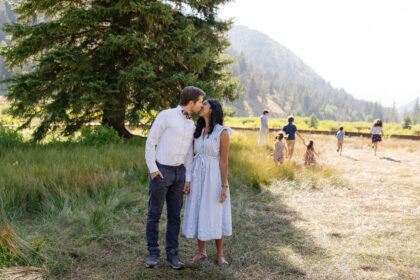This post is sponsored by Good Sam Roadside Assistance
One of my favorite things about RVing is that it makes it so much easier to go adventuring during the winter! While I’m a wuss and very much not interested in tent camping when it’s cold, RVing in winter has been such a fun experience for our family.
Cold weather RVing requires a bit different planning and preparation than RVing in warm weather, though. Whether you’re headed somewhere with snow or that’s just chilly, here are some of our best tips for RVing in the winter!

Best Cold Weather RVing Tips
1. When RVing in the Winter always have a Backup Plan – Roadside Assistance
Sometimes the best laid plans just do not pan out. And while it’s great being prepared and having backup supplies in case of an emergency when rv camping in the winter, sometimes there are situations that you just can’t resolve without assistance. Having emergency roadside assistance like Good Sam Roadside Assistance is not only a nicety, but becomes a necessity when RVing in the winter.
We’ve had a couple experiences of waiting on the side of the road for a local tow company or repair shop to come fix something for us. It was long and frustrating and didn’t feel safe. This was especially true when we got repeated cancellation calls because the techs available didn’t know how to service an RV. This would’ve been impossible to do if we were winter RV camping and there were snow banks on the side of the road, or if it was super cold and we couldn’t get warm.
Having Good Sam Roadside Assistance gives us such peace of mind, especially when winter RV camping. We know that if something were to happen again, we’d not only get taken care of quickly, but we’d also work with someone actually experienced specifically with RVs. This is absolutely indispensable if Rving in the winter when time is of the essence if there’s an unexpected cold weather catastrophe.
2. Pack Emergency Supplies While RVing in Winter
The first step to RV winter camping is to prepare for anything. While most of these tips will hopefully ensure it’s a wonderful and straightforward experience, winter RVing has a few additional challenges with things that could potentially go wrong. So it’s best to be prepared!
Here are some things I recommend having on hand:
- First aid kit + my favorite bandages that actually stay on
- Gallon of water per person per day + food
- Tow strap
- Snow shovel (to clear ice and snow from roof and around rig)
- Flashlight
- Portable jump starter for RV
- Portable air compressor for RV
- Extra blankets and/or sleeping bags
- Waterproof gloves
- Warm base layers
- Wool socks
- Waterproof outerwear
- Waterproof shoes
- Headlamps
- Hair dryer (great for defrosting if hoses/pipes freeze over)
- Emergency GPS device
3. Ensure You Have Sufficient Power & Propane for Winter RVing
How to RV in winter? Ensure you have a sufficient supply of propane to keep your furnace running in your RV in winter. Be ready to fill up propane tanks at least every few days in order to get through repeated cold nights. Possibly even bring extra propane tanks for your winter RV camping trip. If you’re dipping down into below freezing temperatures, however, the RV furnace might not quite cut it.
Instead, you may want to consider a different winter RV heat source. If you have electric hookups or if you have a great RV power setup, then one of the easiest options is to use electric space heaters to heat your RV in the winter. If using these, be extra careful about following all directions and ensure you have proper ventilation. We personally really like this little heater – it’s powerful and one of the safest ones out there to keep you warm when Rving in the winter. Solar panels also make it easy and safe to store up some of that power to run during the night!
4. Insulation, Insulation, Insulation when winter camping in an RV
Insulation is really important for holding onto the heat in your RV in the winter. There are a few different places to add insulation that will keep you warmer and help keep your winter RV to function better.
This is true for RV windows and doors, pipes, and for any hoses. To keep warm while Rving in the winter, be sure to seal the RV windows and doors with heat tape and re-caulk any places that need it. Heavy drapes and reflective foil are great window coverings that retain heat inside your rig and to keep the cold air out. Heat tape and sealant tape are necessities on pipes and hoses and a simple thermal barrier for your windshield goes a long way to prevent heat loss.
5. Add Antifreeze When RVing In The Winter Time
Having your holding tanks freeze up – especially the sewage one – is NOT something you want to deal with while winter camping in your RV. This can cause long-term damage, as well. How to keep RV pipes from freezing while camping? Fortunately, you can take the simple precaution of pouring 1-2 quarts of RV antifreeze down the sink & shower drains and down the toilet. Keep in mind that this will get diluted as you use water throughout your trip. Be sure to add RV antifreeze regularly when RV camping in the winter.
Also, while carrying around extra weight in your holding tank isn’t ideal, having some in there will make it harder for the holding tanks to freeze. Smaller quantities of liquid will freeze up more easily when winter RV camping.
Finally, your holding tanks aren’t the only places you’ll need to add antifreeze. Be sure to check on your actual vehicle, as well! Whether you’re towing a camper with a regular vehicle, or you have a drivable RV, make sure both the radiator and windshield wiper fluid have sufficient antifreeze to stay liquid when cold weather RV camping.
6. Don’t Forget Your Engine When RVing in Winter
As I mentioned above, your engine needs attention, too! If you’re in a truly frigid area, you may want to consider an engine block heater to warm up your engine. This should run for a minimum of 3 hours before you head off. Also, be sure to check your engine battery before you head out on your winter RV camping adventure. A weak battery will only get worse in cold weather.
7. Winter RVing Tips, Set Up In Sunny Areas
A top tip for RV camping in cold weather is to use the weather to your advantage! Even in really cold temps, the sun can be useful for generating warmth and power for your winter RV camping trip. It also helps to keep things from icing over. If at all possible, try to set up in a sunny spot to help with not accumulating much snow and ice when cold weather RVing. Remember, wherever you set up, be sure to clear any snow, ice, and salt gently from your rig before doing things like adjusting slides, opening doors, or turning on windshield wipers.
8. Carry (and use if needed) Tire Chains For RVing In The Snow
Some states will actually require that you use chains in certain areas. Some also require you to carry them with you if not needed at that time. Other places don’t require it, but it’s still a really good idea to have them for all driving wheels (often only your front two wheels) available to you so you can safely drive in winter weather.
9. RVing in Cold Weather, Disconnect Hookups
The easiest way to let hoses freeze and break is by leaving them out in the cold. When doing some RVing in the winter, I highly recommend not leaving hookups attached for long periods of time if it’s very cold. Of course, that will mean that you don’t have constant water flow or sewage drainage, but that’s way better than having your water hose freeze and break off!!
Instead, consider just hooking up once to fill up water, and dumping before you leave (again, a fuller tank will have a harder time freezing up). Then immediately after you’re finished with the hose, wrap it and put it back inside your RV (preferably in a heated compartment). Don’t forget to close your valves when Rving in the winter!
If you need to have constant hookups, consider something like this heated water hose (another option here) to keep your hose from freezing. Using a heated hose, along with this holding tank heater pads is great to prevent freezing.

There you have it! Our best tips for RVing in the winter. It definitely felt daunting to us at first but with the proper preparation and backup plans, RVing in winter can be so fun. I hope these tips for RVing in winter were helpful for keeping you safe while helping you get out RVing in the snow and cold!
IF YOU LIKED THIS POST ABOUT OUR BEST TIPS FOR RVING IN WINTER, YOU MIGHT LIKE THESE POSTS TOO:
- RV Essentials Checklist when Renting an RV with Kids
- How to Choose the Best Family RV
- Working From An RV: RV Internet Setup
NOT PLANNING ON RVING IN THE WINTER RIGHT NOW? PIN FOR LATER.











